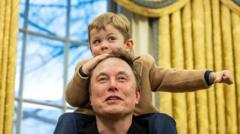As the tech mogul navigates the political landscape, his children are becoming more than just personal companions, serving strategic purposes in his public image.
Elon Musk’s Family: The Political Strategy Behind Bringing Kids to Work

Elon Musk’s Family: The Political Strategy Behind Bringing Kids to Work
Musk’s decision to include his children in high-profile public events blurs the line between family and politics.
Elon Musk, the tech billionaire and founder of SpaceX and Tesla, has become a familiar figure not just in the realms of technology and business, but increasingly in politics. And as he steps further into the spotlight of American leadership, including his recent role in the Department of Government Efficiency, his children have also made their mark—often accompanying him to pivotal events.
From notable meetings with world leaders to discussions in the Oval Office, Musk’s children have been a consistent presence. Most recently, his four-year-old son, affectionately known as “Lil X,” was seen at the Resolute desk, fashionably dressed in a tan coat. The following day, Lil X, along with his siblings, exchanged gifts with Indian Prime Minister Narendra Modi while their father engaged in serious discussions about technology.
Why does Musk bring his children along? According to Kurt Braddock, a public communication expert at American University, this move appears to be a strategic one aimed at humanizing Musk’s public persona. “The inclusion of the kids in many public appearances makes him seem more personable and relatable to the public,” he observed. However, the decision to introduce children to such high-stakes environments may also serve to draw focus away from other pressing matters.
Jon Haber, a strategic communication consultant, supports this notion, suggesting that Musk's antics—and the chaos they create—benefit both him and the political landscape surrounding President Trump. “For Trump, chaos is a tactic; it allows him to flood the public’s attention and obscure less favorable topics,” he explained.
Yet, not everyone is on board with this blending of family and politics. Grimes, the mother of “Lil X,” voiced her concerns over her son’s public presence. “He should not be in public like this,” she shared on X, emphasizing the importance of shielding children from the spotlight in political contexts, a sentiment she echoed in a previous interview.
Musk’s penchant for having his children around isn't new. Even during Tesla's early days, he welcomed his kids to events, often creating a more relaxed atmosphere than the stiff corporate vibe typically expected from high-profile unveilings. His commitment to his children appears unwavering, as highlighted by biographer Walter Isaacson, noting Musk’s almost obsessive dedication to his family.
Through these familial displays, Musk is not only strengthening his public image but also reshaping perceptions of fatherhood within the high-octane world of technology and politics. His children have transitioned from being mere companions to active participants in the public narrative he is crafting as he navigates this powerful landscape.
From notable meetings with world leaders to discussions in the Oval Office, Musk’s children have been a consistent presence. Most recently, his four-year-old son, affectionately known as “Lil X,” was seen at the Resolute desk, fashionably dressed in a tan coat. The following day, Lil X, along with his siblings, exchanged gifts with Indian Prime Minister Narendra Modi while their father engaged in serious discussions about technology.
Why does Musk bring his children along? According to Kurt Braddock, a public communication expert at American University, this move appears to be a strategic one aimed at humanizing Musk’s public persona. “The inclusion of the kids in many public appearances makes him seem more personable and relatable to the public,” he observed. However, the decision to introduce children to such high-stakes environments may also serve to draw focus away from other pressing matters.
Jon Haber, a strategic communication consultant, supports this notion, suggesting that Musk's antics—and the chaos they create—benefit both him and the political landscape surrounding President Trump. “For Trump, chaos is a tactic; it allows him to flood the public’s attention and obscure less favorable topics,” he explained.
Yet, not everyone is on board with this blending of family and politics. Grimes, the mother of “Lil X,” voiced her concerns over her son’s public presence. “He should not be in public like this,” she shared on X, emphasizing the importance of shielding children from the spotlight in political contexts, a sentiment she echoed in a previous interview.
Musk’s penchant for having his children around isn't new. Even during Tesla's early days, he welcomed his kids to events, often creating a more relaxed atmosphere than the stiff corporate vibe typically expected from high-profile unveilings. His commitment to his children appears unwavering, as highlighted by biographer Walter Isaacson, noting Musk’s almost obsessive dedication to his family.
Through these familial displays, Musk is not only strengthening his public image but also reshaping perceptions of fatherhood within the high-octane world of technology and politics. His children have transitioned from being mere companions to active participants in the public narrative he is crafting as he navigates this powerful landscape.



















